When it comes to flooring options, two of the most sought-after choices are vinyl and hardwood flooring. Both materials have unique qualities, offering distinct advantages that cater to a wide range of preferences, budgets, and practical needs.
Vinyl flooring stands out for its durability, affordability, and versatility, making it a favorite among homeowners and businesses seeking an elegant yet low-maintenance option. On the other hand, hardwood flooring solutions are renowned for their timeless beauty, natural warmth, and ability to enhance a property’s value, delivering a sophisticated touch that lasts for decades with proper care.
Choosing between vinyl and hardwood flooring often depends on various factors, including lifestyle, space usage, aesthetic goals, and long-term investment plans.
This guide will help you navigate the key differences between these two popular options. From types and benefits to installation considerations, we’ll explore everything you need to know to make an informed decision.
What Is Vinyl Flooring?
Vinyl flooring has become a go-to choice for many homeowners and businesses, thanks to its affordability, durability, and visual appeal. Made primarily from polyvinyl chloride (PVC), this versatile material is designed to mimic the look of natural wood, stone, or ceramic while offering the practical advantages of water resistance, easy maintenance, and long-lasting durability.
Whether you’re considering it for your home or commercial space, vinyl flooring provides a cost-effective way to achieve a stylish, functional, and low-maintenance flooring solution.
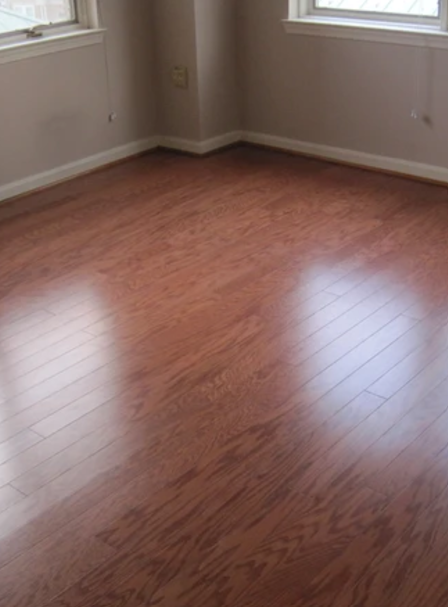
Exploring the Types of Vinyl Flooring
Vinyl flooring comes in various styles, formats, and finishes, making it adaptable to different design needs and environments. Here’s a closer look at its key types:
Vinyl Plank Flooring: A Hardwood Alternative
Vinyl plank flooring is engineered to replicate the appearance and texture of hardwood, making it a popular choice for those who love the warmth of wood but require more durable and water-resistant options. It comes in a range of colors and finishes to suit both traditional and contemporary interiors.
From residential vinyl plank installation to commercial vinyl plank flooring, these planks deliver a wood-like aesthetic without the maintenance headaches associated with natural wood.
Vinyl Tile Flooring: A Versatile Design Option
Vinyl tile flooring offers the perfect balance between beauty and practicality. Designed to mimic ceramic or stone tiles, vinyl tiles allow for intricate patterns and designs, making them a favorite for spaces like kitchens and bathrooms. Professional vinyl tile installationis celebrated for its water resistance, affordability, and ease of cleaning.
Luxury Vinyl Flooring (LVF): Elegance Meets Resilience
Luxury vinyl flooring stands at the pinnacle of the vinyl category. Whether it’s luxury vinyl plank flooring or high-quality vinyl tiles, LVF combines aesthetic appeal with enhanced durability. Its designs closely mimic natural materials, delivering a premium look that is ideal for high-traffic areas or sophisticated interiors.
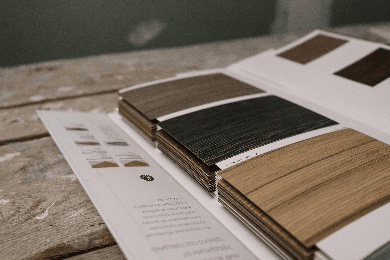
What Is Hardwood Flooring?
Hardwood flooring is a classic and natural flooring option crafted from real wood, prized for its enduring beauty and exceptional quality. Unlike synthetic alternatives, hardwood brings the richness of nature into your space, providing warmth and character that stands the test of time. Its appeal lies in its authenticity, with unique grains, textures, and tones that give each floor a one-of-a-kind appearance.
From cozy, rustic homes to sleek, modern interiors, hardwood flooring complements various design styles. Its versatility stems from the availability of different wood species, each offering distinct aesthetic and functional properties. Popular options include oak, maple, cherry, and hickory, with choices ranging from light, airy hues to deep, rich tones.
Whether you’re seeking a polished look for a formal dining room or a warm, inviting vibe for a living space, hardwood flooring delivers unparalleled sophistication.
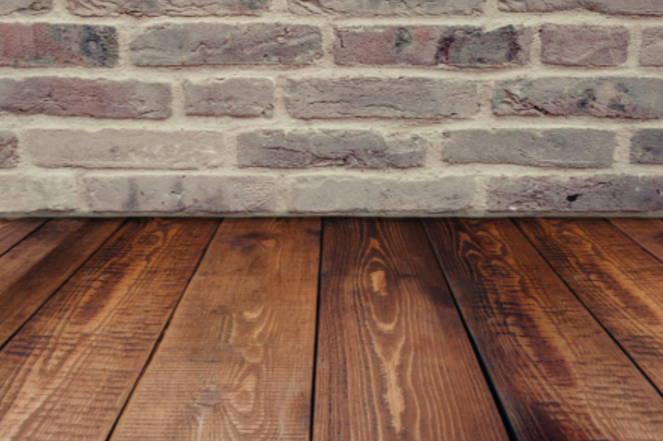
Types of Hardwood Flooring
Hardwood flooring comes in two primary types, each offering unique characteristics to suit different needs and preferences:
1. Solid Hardwood Flooring
Solid hardwood flooring is the quintessential choice for those who appreciate tradition and durability. Each plank is milled from a single piece of natural wood, providing unmatched longevity and the ability to be refinished multiple times. This makes it an excellent investment, as it can be restored to its original beauty even after decades of use.
Available in various thicknesses, widths, and finishes, solid hardwood offers endless customization options. However, it’s essential to note that solid hardwood can be sensitive to environmental factors like humidity and temperature changes, making it more suitable for controlled indoor environments. Its durability and timeless appeal make it a top choice for living rooms, dining areas, and other high-traffic spaces.
2. Engineered Hardwood Flooring
Engineered hardwood flooring is a modern alternative that combines the beauty of real wood with enhanced practicality. It features a thin veneer of genuine wood on the surface, bonded to a high-quality plywood or composite base. This construction provides greater resistance to moisture and temperature fluctuations compared to solid hardwood.
Engineered hardwood is ideal for areas like basements or spaces with radiant heating, where solid hardwood might not perform as well. It also offers versatility in installation, with options for glue-down, nail-down, or floating methods. While it may not have the refinishing lifespan of solid hardwood, engineered hardwood delivers exceptional durability and style, often at a more budget-friendly price point.
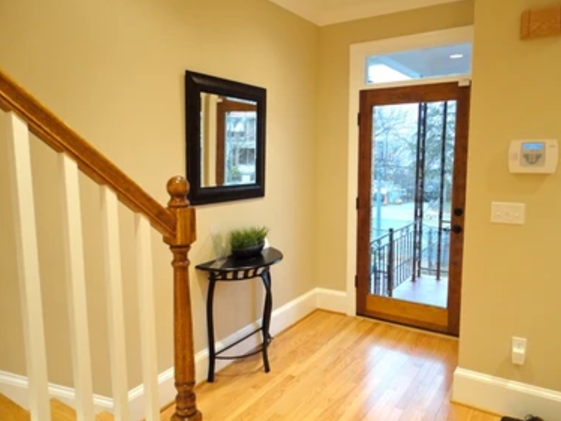
Durability and Longevity
Vinyl Flooring
Vinyl flooring is celebrated for its durability, making it an excellent choice for households and commercial spaces alike. It is inherently resistant to scratches, stains, dents, and even water, which makes it particularly suitable for high-traffic areas, kitchens, and bathrooms.
The resilience of vinyl plank flooring solutions often depends on the quality of the product. For instance, luxury vinyl planks and tiles tend to offer enhanced durability due to their thicker wear layers.
On average, well-maintained vinyl flooring can last between 10–20 years, but some high-end products can extend their lifespan beyond two decades. Its resilience against wear and tear, combined with its affordability, makes vinyl flooring a practical choice for families and businesses seeking cost-effective vinyl flooring solutions without compromising on quality.
Hardwood Flooring
Hardwood flooring stands out for its incredible longevity, often lasting 30–100 years when properly cared for. Unlike vinyl, which wears down over time, hardwood can be restored through refinishing, allowing homeowners to rejuvenate its surface and remove imperfections like scratches or stains. This capability makes hardwood a long-term investment.
However, hardwood is more sensitive to environmental factors such as moisture and temperature fluctuations, which can lead to warping or swelling if not addressed. While engineered hardwood offers improved resistance to such issues, solid hardwood requires consistent maintenance and care to ensure its durability.
Hardwood flooring experts recommend periodic refinishing and sealing to protect the wood and extend its life, keeping it a timeless choice for generations.
Cost Comparison
Vinyl Flooring
When it comes to affordability, vinyl flooring is a clear winner. It provides a high-end aesthetic at a fraction of the cost of hardwood. Installation costs are also relatively low, especially for residential vinyl plank installation, as the process is less labor-intensive.
For budget-conscious homeowners or businesses, affordable vinyl plank flooring can achieve the appearance of hardwood or stone without the hefty price tag. Vinyl’s cost-effectiveness extends to its maintenance, as it requires minimal upkeep, further saving costs in the long run.
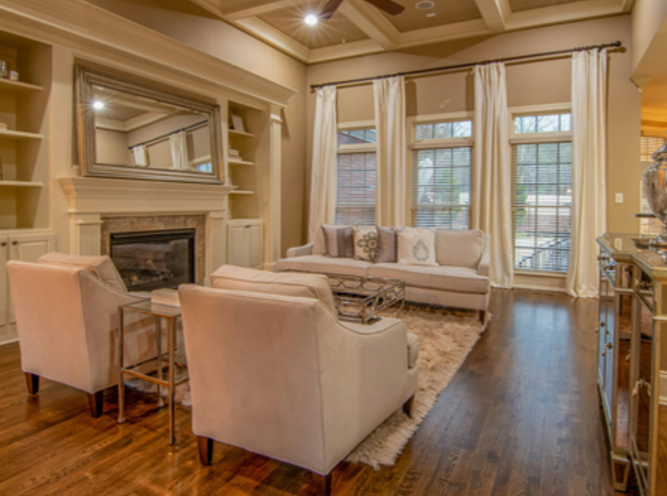
Hardwood Flooring
Hardwood flooring, on the other hand, requires a higher upfront investment. The price varies significantly based on the type of wood, the width of the planks, and the finish chosen. Additionally, hardwood flooring installation services can be more expensive due to the expertise and time required.
Despite the initial cost, hardwood offers significant long-term value. It enhances a home’s resale price and adds an air of luxury that synthetic materials often struggle to replicate. Many consider it an investment in both aesthetics and functionality, making the higher cost worthwhile for those prioritizing quality and longevity.
Aesthetic Appeal
Vinyl Flooring
Modern vinyl flooring has evolved dramatically, offering designs that closely mimic natural materials like wood and stone. High-quality luxury vinyl plank flooring and tiles provide textures and grains that replicate real hardwood or marble with impressive accuracy. This allows homeowners to achieve a sophisticated look at a lower cost.
Vinyl also offers a wide variety of styles, colors, and patterns, making it a versatile choice for various interior design themes. Whether you’re aiming for a rustic farmhouse look or a sleek modern aesthetic, vinyl flooring experts can guide you in selecting a style that complements your space perfectly.
Hardwood Flooring
Hardwood flooring exudes natural beauty and timeless elegance. With its unique grains, textures, and warm tones, it brings a sense of authenticity and richness that synthetic alternatives often lack. Whether you choose oak, maple, or walnut, each type of wood offers distinct characteristics that enhance the overall aesthetic appeal of your home or office.
The versatility of hardwood makes it suitable for a wide range of styles, from traditional to contemporary. Professional hardwood flooring installations ensure that every plank is perfectly aligned, highlighting the wood’s natural charm and creating a polished finish that elevates any room.
Water Resistance
Vinyl Flooring
Vinyl flooring is inherently waterproof, making it an ideal choice for areas prone to moisture, such as bathrooms, kitchens, and basements. Its water-resistant properties are a significant advantage over hardwood, particularly in homes with children or pets.
For businesses located in humid environments, commercial vinyl plank flooring provides a durable and worry-free solution that withstands spills and damp conditions without warping or staining. The material’s ability to repel water extends its lifespan and maintains its aesthetic appeal over time.
Hardwood Flooring
Hardwood flooring, while durable, is more vulnerable to water damage. Excessive moisture can cause the wood to swell, warp, or develop stains, making it less suitable for wet areas. Engineered hardwood offers slightly better moisture resistance than solid hardwood, but it still requires careful maintenance to prevent water-related issues.
To protect hardwood flooring in moisture-prone spaces, homeowners need to seal it properly and address spills immediately. Regular maintenance and refinishing by hardwood flooring contractors can help mitigate the effects of water exposure and preserve its natural beauty.
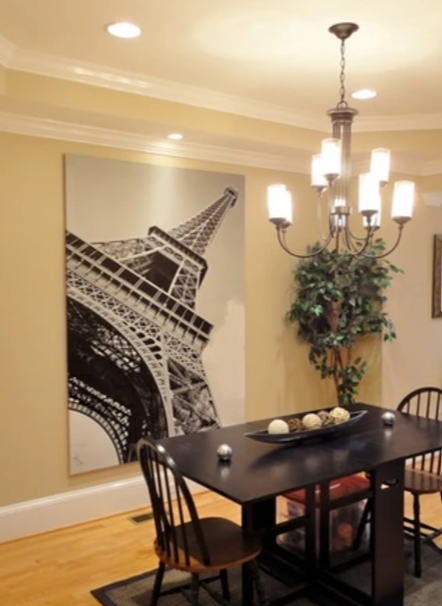
Ease of Installation
Vinyl Flooring
Vinyl flooring is relatively simple to install, thanks to advancements in design and technology. Options like click-and-lock systems for planks or peel-and-stick tiles make the installation process straightforward. However, for a professional finish, enlisting vinyl tile contractors or specialists in vinyl plank flooring services ensures precision and durability.
Vinyl’s lightweight nature and flexibility further simplify installation, allowing it to be laid over existing floors in many cases. This reduces both labor time and costs, making it an accessible choice for homeowners and businesses alike.
Hardwood Flooring
Hardwood flooring requires more expertise during installation, as it involves precise measurements, sanding, and sealing. The process is best left to local hardwood flooring installers, who have the skills and tools necessary to achieve a flawless result.
While the installation of hardwood is more labor-intensive and time-consuming than vinyl, the outcome is a beautifully finished floor that adds significant value and sophistication to your property. A properly installed hardwood floor can last for decades, making the initial effort well worth the investment.
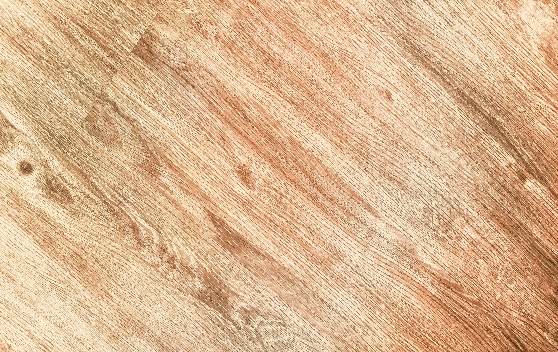
Which Is Better for Your Needs?
Consider Vinyl Flooring If:
- You need a water-resistant option.
- Budget is a primary concern.
- You desire easy maintenance.
Consider Hardwood Flooring If:
- You value natural beauty and durability.
- You’re willing to invest in long-term value.
- Your space requires an elegant, high-end finish.
Choosing between vinyl and hardwood flooring can be challenging, but Floorcraft is here to help.
We specialize in hardwood flooring installation, vinyl plank flooring services, and professionalvinyl tile installation, ensuring every project meets your unique needs.
With personalized attention and expertise based on decades of experience, Marty at Floorcraft can guide you through the selection and installation process, delivering exceptional results. We can also bring our mobile showroom to you and help you choose the best option for your property.
Ready to transform your space?
Call us today for a free estimate and experience the difference personalized service makes!